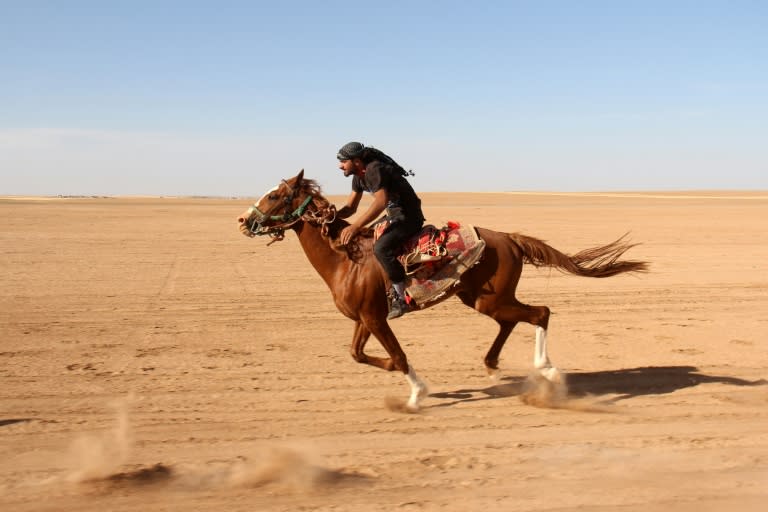Rebel parts of Syria revive beloved Arabian horse races
Perched on his chestnut steed Shams, teenager Munzer triumphantly held up his first place trophy at a rare horse race staged in an opposition-held area of Syria. Dozens of men and young children, their faces enveloped in red checkered keffiyehs, looked on as about 20 horses raced each other in the northern Syrian desert this month. The spectators broke out into a lively line-dance and shot celebratory gunfire into the air as each muscled creature blasted past the finish line, kicking up clouds of golden sand. Munzer Jahjah, only 14, was one of the youngest jockeys in the race outside the rebel-controlled village of Buwaider, in Aleppo province. "This is the first time I'm participating in a horse race, and I won first place!" said Munzer, affectionately patting Shams, whose name means "sun" in Arabic. His jet-black hair fell into his eyes, and instead of riding boots he wore a pair of sandals. Forgoing the traditional saddle, Munzer had hung a colourful rug over the six-year-old mare -- an Arabian purebred. Arabians are one of the oldest horse breeds in the world, known widely to be friendly, strong and excellent racers. The horses are thought to originate from the Arabian Peninsula, but it was Bedouin tribes in the northern Syrian desert who became famous for maintaining their pure pedigree. In 2010, Syria had nearly 750 breeding Arabian horses, according to the World Arabian Horse Organisation (WAHO), which aims to preserve Arabian purebreds around the globe. - 'Rooted in Arab history' - But there have been no new WAHO reports on Syria's Arabian horses since 2011, when the country's devastating conflict broke out with widespread protests against President Bashar al-Assad's rule. Since then, more than 320,000 people have been killed and half the country's population displaced. The war has also taken a toll on Syria's Arabian horses, many of which have been killed or wounded in fighting. Proper veterinarian care and vaccines in particular are hard to come by, race organiser Mohammad Naanaa told AFP. Naanaa is the deputy chair of "Dawn for Arabian Horses," an opposition-run organisation founded in 2016. "Equestrianism is rooted in our Arab history," Naanaa said. "Our goal is to preserve the pure breed of Arabian horses and try to provide them with health care and food," he told AFP. To do so, they are registering any new Arabian horses born after Syria's conflict began. That registration process is a key part of preserving purebreds, said Yehya al-Afandi, who heads Dawn for Arabian Horses. "Since the war broke out, WAHO only registers horses in regime-controlled areas (where races are held on a regular basis). It doesn't interact with anyone in our (opposition) zones," Afandi said. As a result, no Arabian foals born in opposition-held territory after 2011 -- including Shams -- have been officially registered. "We are organising ourselves, we're aiming to get these horses registered with WAHO," Afandi said. - 'Forget the war' - Races like the one held outside Buwaider help draw attention to the horses' plight, Afandi added. In line with Islamic tradition and state laws across the region, betting is not allowed at the horse races, which are split into two rounds: the first for purebreds, and the second for hybrids. The hybrid round was won by the stallion Buraaq -- whose Arabic name translates to "shining" -- and his grinning 34-year-old jockey Ramadan al-Issa. "This is the third time I win first place. I can't describe how happy I am," said Issa, who hails from neighbouring Idlib province. Mustapha, 33, traveled from Idlib to cheer on Buraaq, his favourite horse. "Before the war, we would go to races each year. But now, they're about every two years," Issa told AFP. "You can feel people's joy all around you, and for a moment it makes you forget the atmosphere of war."





